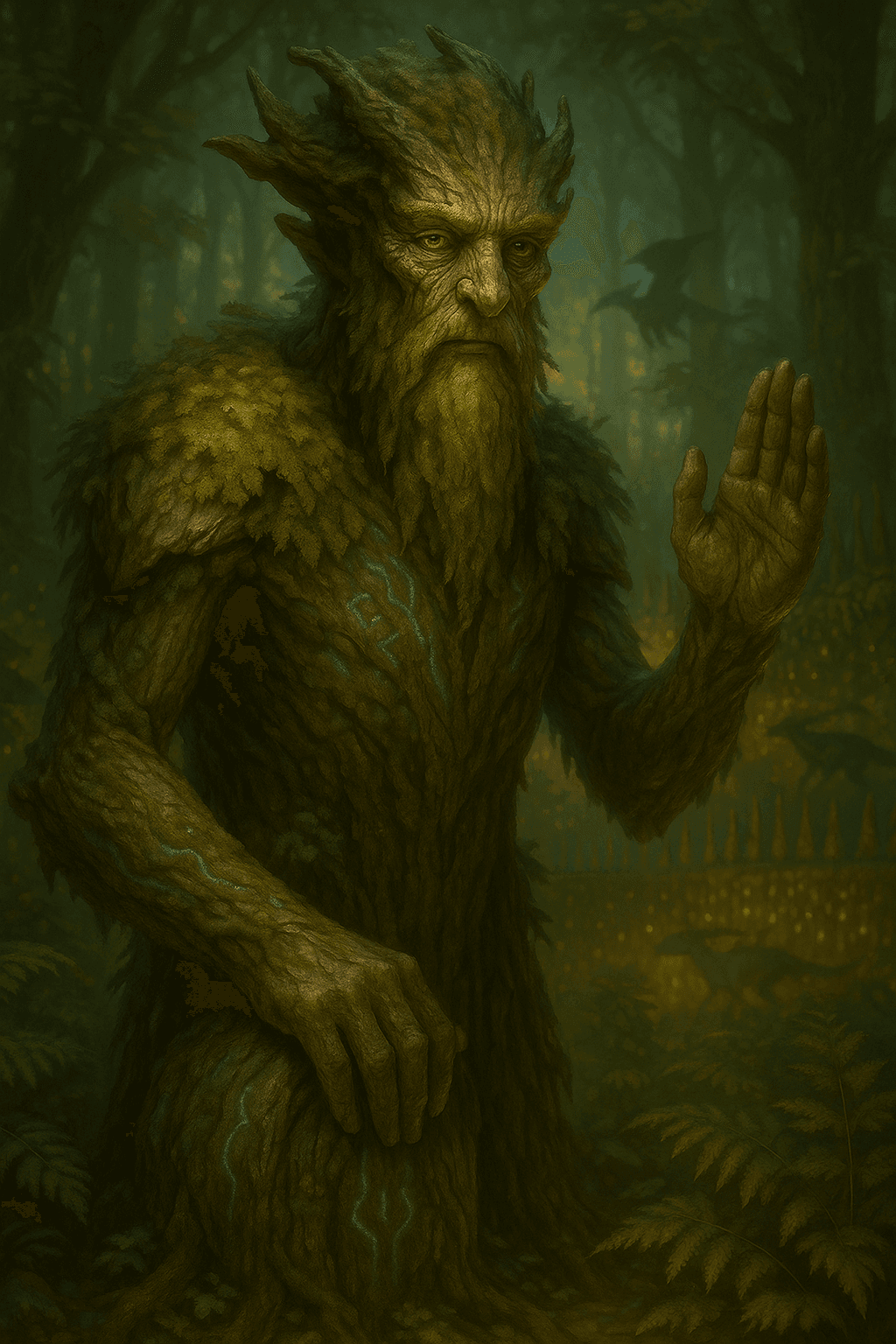Elderwood Guardian
Hold fast, and the forest will hold with you.

They named him the Elderwood Guardian because no single name could bear the weight of what he kept. Bark-thick and mountain-still, he rose from the heart of Thornhall Grove like a living bastion—rings upon rings of memory, roots braided through the oldest ley-stones. Where others argued policy, he practiced endurance. Where others sought victory, he chose preservation. When fear and hunger pushed at Galdrowen’s borders, the Guardian became the answer the forest gave back: not fury, but an unyielding no.
Twilight Stewardship.
In the long dusk when great powers faltered and the world learned to live with its scars, the Guardian accepted the Circle’s mantle. He did not seize command; he was planted in it. The council-tree itself raised new burls to fit his hands, and the leyline’s pulse steadied whenever his shadow fell across the grove. He ordered the sacred glades to be sealed with living wards rather than iron: quilts of resin set with shed Thornspine quills, humming in low, warning tones; whisper-vines trained to tighten around trespass without breaking bone; waystones tuned to confuse murderous intent while letting the lost find water.
He kept the Grove-Wyrms hidden and unharmed. “Cathedrals of breath,” he called them, and forbid the young from boasting of their whereabouts. The Thornspines he honored as the forest’s stance—granting wardens leave to run with patrol packs so that human and drake learned the same perimeter dance. To healers, he gave Kara Windshade’s careful ledgers and a single command: every thorn you draw must mend a wound larger than itself.
His rule felt, to some, like winter—clean, quiet, and unarguable. The skirmishes with the Mire sharpened that chill. Duskfall’s Whispering Bloom pressed along the broken edgelands, testing the music of the quilts, slipping Memory Drakes through rifts of fog. The Guardian met them with patience and geometry: shifting hedges, false paths that ended in generosity (a cache of herbs, a skin of water) and an escort back across the boundary. When ambush forced blood, he made the tragedy brief and the graves gentle. Moss grew thick where his footsteps paused.
Not everyone welcomed the hush. Thalia Fernstep spoke for the curious—arguing that a forest that never opens its paths becomes a prison even to trees. Rootcaller Brannok, gruff and tender as old bark, sided with the Guardian but worried what isolation would make of the young. Nuala of the Grove visited in dreams, offering riddles that sounded like doors. The Guardian listened to each voice, even those that came angry or wet with grief, and then returned to the task for which he’d been grown: to carry the memory of green across a season of ash.
His counsel moved like water through stone. Wardens learned to walk with calmer breath; patrol routes curved to spare nesting owls; the quilts’ hum settled from threat to presence. When ash-raiders from the south tried to burn through the border with oil and prayer, the forest answered in the Guardian’s tempo—slow, unstoppable—smothering flame with leaf and wet earth until only embers remained. He did not hang trophies. He counted saplings.
He was not without ambition; he simply aimed it inward. “Preserve the conditions in which kindness can become policy,” he told the Circle, and then modeled it. When a captured Shadekin scout refused food for three days, the Guardian set a bowl of broth beneath a fern and turned his gaze away, granting the dignity of choosing to eat alone. When a Thornspine brood went skittish from the quilts’ new resonance, he pressed his palm to root and hummed until the border-tone shifted a half-note gentler. The brood settled; the ward held.
Under his watch, Galdrowen did not swell, but it did not shrink. Children grew up knowing the forest’s edges were not walls but breaths—out on patrol at dawn, in to council at dusk. The Guardian taught oaths the old way, palm to living wood, and enforced them the same way: by expecting better, again and again, until expectation became habit. In quiet hours he could be found beside the council-tree, one hand on bark, the other open in a posture that was almost a benediction and almost a shield.
Some say he spoke with the Elder who came before, a conversation of rings and rain carried through root and stone. Others say he carried solitude like a wound and hid it beneath moss and duty. What is certain is this: when the wind moved through Thornhall and smelled of rain, the Circle stood a little straighter. The Guardian’s presence did what treaties and banners could not—it made people remember they belonged to something patient.
If there is a measure for leadership in hard years, it is not the number of enemies defeated but the number of futures left intact. By that measure, the Elderwood Guardian’s ledger is rich. He left behind fewer ruins, more paths, and a forest that knew how to outlast a long night without learning to love it. In times when the world shouted, he taught Galdrowen to answer with a living, steady tone.
